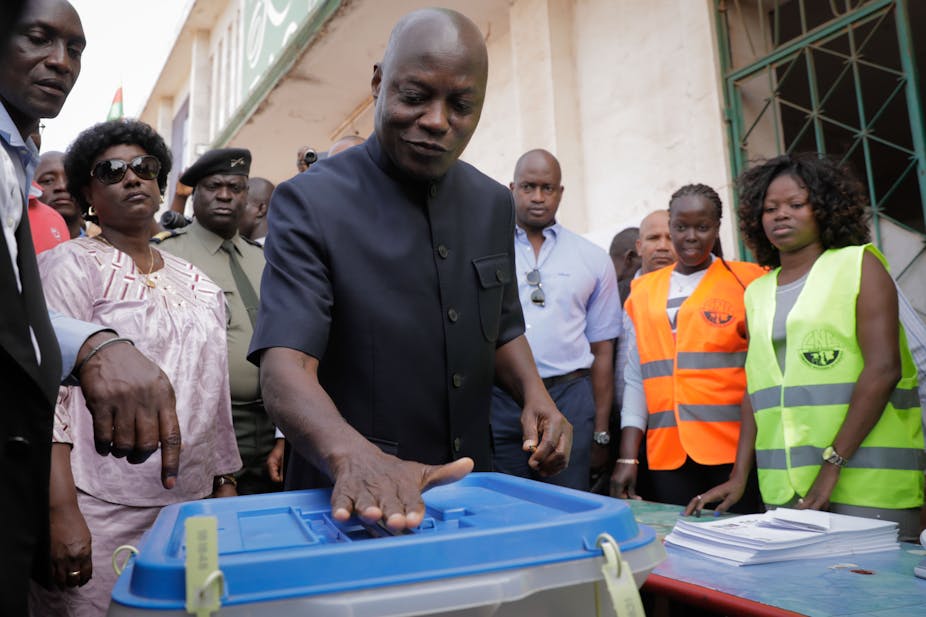In recent times, Guinea-Bissau has made promising political gains despite a long history of coups. This was reflected most clearly when the country held peaceful and successful legislative elections in March.
Additionally, incumbent president José Mário Vaz is the first elected leader in Bissau-Guinean politics to finish a constitutional term.
But the country is now in the middle of an evolving political crisis precipitated by the president’s actions. The first was a refusal to approve his party’s choice of prime minister. Second, in the ensuing crisis, his term elapsed in late June with no government in place.
Vaz remains in office without legal or constitutional mandate or historical precedent. So what caused this political crisis and what does it mean for stability in the shadow of a November presidential election?
The makings of a political crisis
A year after the restoration of constitutional order and a credible general election in 2014, Vaz stoked political controversy when he abruptly removed his political party colleague and prime minister Domingos Simões Pereira from his post and dissolved the parliament.
The problems caused by this internal party rivalry seemed to be initially solved by the successful legislative election in March 2019. The ruling party won 47 out of 102 seats in what was a peaceful election.
But when the governing party sought to again nominate Pereira as prime minister, Vaz quickly rejected him. He gave the position to his longtime political rival Aristide Gomes.
The situation remained volatile. Vaz’s term ended in June before approving Gomes’s cabinet. This created a potentially dangerous power vacuum because only the president can approve the cabinet of a prime minister under the constitution.
But Vaz offered a remedy – extend his term until the November election and he would approve the cabinet and oversee governance. This enraged the ruling party, who quickly voted to strip him of his office. The national assembly then named speaker Cipriano Cassama as interim president.
Exacerbating this constitutional crisis, Vaz promptly ignored the proclamation and attended a regional summit in Nigeria as president of Guinea-Bissau.
Most recently, the Economic Community of West African States stepped in with a political compromise. Vaz was granted his wish to stay on as president until the next election with more limited powers. In exchange, he appointed the Gomes’s cabinet and fired his attorney general.
But Vaz has shown a history of ignoring the political demands of his rivals.
These political rivalries amid transition, a presidential election and poor economic prospects for the general population, point to a heightened risk of a coup event within the next six months.
Coup risk

Guinea-Bissau has experienced eight coup events since 1980 and five since January 2000. Three took place while anticipating an election or directly following an election. The 2012 coup was strongly linked to distrust between the military and political leadership. Then candidate Gomes Junior had supported an initiative to downsize the military for financial reasons and to curb further meddling by the military into political affairs.
Based on information generated by our coup predicting algorithm we expect Guinea-Bissau to see a sharp increase in its coup risk-percentile as it approaches the election date in November this year.
This pattern is similar to the one that led to the last coup event in 2012. Our algorithm has good historic accuracy and provided clues into global political crises over the last six months.
Political deadlock, uncertainty about who is in control and socio-economic problems all increase the risk of a military coup. But the upcoming presidential election may be the straw that breaks the camel’s back.

Elections can be highly volatile periods and there is a strong empirical link between election periods and coup events globally since 1950. Electoral periods can present challenges to entrenched ruling authorities or highlight serious instability in the broader political environment.
Military elites may thus be driven to intervene politically to restore a previous ruler, or even take political control to prevent changes they see as harmful to the military apparatus or the country at large.
But how does this apply to Guinea-Bissau?
The military as a catalyst
The military’s role in Bissau-Guinean politics has been solidified since independence. It has often stepped in during times of crisis or political stalemate.
Vaz used his tenure to target perceived corruption in the general ranks of the military. He also sought to decrease the size of the army and to curb resources. One of his first acts was to order the forced retirement of up to half of the country’s armed forces, including former general and coup leader Antonio Indjai.
Vaz’s policies were aimed at reducing the power of the military elite to disincentivise future interventions. But in many ways Guinea-Bissau is ripe for military intervention and the outcome of the November election will test Vaz’s policies and show if they have been successful in mitigating coup risk or not.
Cautious optimism
Given the successful March elections and the significance of Vaz’s historic tenure, there are reasons to be cautiously optimistic about Bissau-Guinean politics going forward.
Caution is warranted because the ongoing political crisis and election cycle will deeply test these gains.
While the Ecowas-led compromise seems to have tempered an escalation in potential political infighting, the political situation remains precarious.
If the current political elites can commit to the current compromise while military leaders show restraint, it is likely that the November election will be successful.
If that election results in a peaceful transfer of executive power, it would be a clear signal that Guinea-Bissau has turned a corner. With consistent political stability, the nation of 1.8 million would also be better equipped to deal with its pressing socio-economic challenges.

